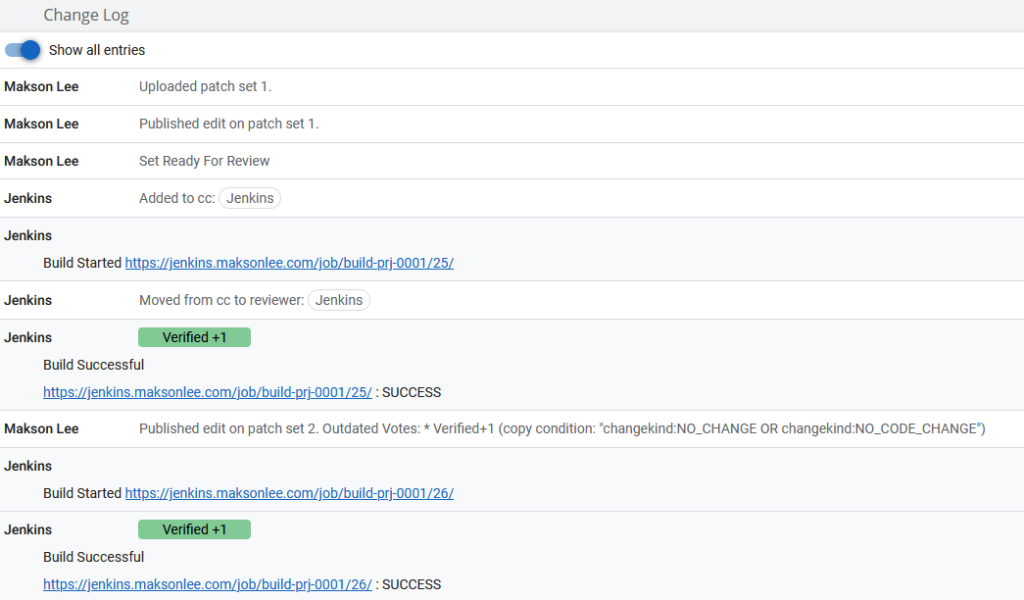In large-scale Android development, it’s essential to verify each proposed change before it’s merged into the integration branch. This guide shows how to integrate Jenkins with Gerrit Trigger Plugin to automatically build AOSP whenever a developer pushes a patchset to integration branch.
Only changes that pass the build are allowed to merge, ensuring the integrity of the integration branch.
Workflow Summary
- Developers push code to:
refs/for/prj-0001-15-vanilla - Jenkins automatically builds each patchset
- Jenkins votes Verified +1 if the build succeeds
- Only Verified +1 changes are allowed to be merged
Plan for Build Load at Scale
Important Note: Building AOSP is resource-intensive, it consumes a lot of CPU, memory, and disk.
While a single AOSP build is already heavy, the real challenge comes when:
- Multiple developers submit patchsets simultaneously
- Jenkins triggers many AOSP builds in parallel
If your CI system isn’t properly scaled, builds will queue up or fail due to insufficient resources.
Prerequisites
Before continuing, make sure:
- You already have Jenkins set up with an agent capable of building AOSP
- The AOSP build environment (e.g. Docker + SSH-connected agents) is already configured
If not done yet, check out this first:
Build Android 15 AOSP with Jenkins and Docker on an SSH-Connected Agent
- Set Up Jenkins with Gerrit Trigger Plugin
- Go to Manage Jenkins → Plugins → Available
- Install:
- Gerrit Trigger Plugin
This will also install required dependencies like Git and SCM API plugins.
- Gerrit Trigger Plugin
- After installation, go to Manage Jenkins → Gerrit Trigger
- Click New Server and configure:
- Add New Server: Gerrit
- Type: Gerrit Server with Default Configurations
- Click Create
- Click New Server and configure:
- Configure
Gerrit Connection Setting
| Field | Value |
|---|---|
| Name | gerrit |
| No Connection On Startup | (optional) |
| Hostname | gerrit.maksonlee.com |
| Frontend URL | https://gerrit.maksonlee.com/ |
| SSH Port | 29418 |
| Proxy | (leave blank if unused) |
| Username | jenkins |
| (optional) | |
| SSH Keyfile | /var/lib/jenkins/.ssh/id_ed25519 |
| SSH Keyfile Password | 🔐 Concealed |
| Build Current Patches Only | ✅ (recommended) |
| Vote patch sets with same topic | ✅ (optional) |
REST API
| Field | Value |
|---|---|
| Use REST API | ✅ Enabled |
| Gerrit HTTP Username | jenkins |
| Gerrit HTTP Password | 🔐 Concealed |
| Enable Code-Review | (Optional) ✅ |
| Enable Verified | ✅ Enabled |
- Gerrit Permissions
The Gerrit user (jenkins) used in the Jenkins plugin must have both SSH and REST API access with proper permissions on the project and branch scope.
| Ref | Permission |
|---|---|
refs/heads/* | Read |
refs/for/* | Read |
| refs/changes/* | Read |
| Ref | Permission | Range |
|---|---|---|
refs/for/prj-0001-15-vanilla | Label Verified | -1..+1 |
| Ref | Permission | Range |
|---|---|---|
refs/for/prj-0001-15-vanilla | Label Code-Review | 0..+1 |
- Create Jenkins Pipeline Job
pipeline {
agent {
label 'ssh-agent-with-docker'
}
environment {
CCACHE_PATH = "/home/administrator/.cache/ccache"
MIRROR_PATH = "/home/administrator/mirror"
}
triggers {
gerrit(
serverName: 'gerrit',
gerritProjects: [[
compareType: 'ANT', pattern: '**',
branches: [[compareType: 'PLAIN', pattern: 'prj-0001-15-vanilla']]
]],
triggerOnEvents: [
patchsetCreated(excludeNoCodeChange: true, excludeWipState: true, excludeDrafts: true),
wipStateChanged()
]
)
}
stages {
stage('Clean Workspace') {
steps {
deleteDir()
}
}
stage('Build AOSP') {
steps {
script {
docker.image('harbor.maksonlee.com/library/aosp-builder').inside("-v ${CCACHE_PATH}:/ccache -v ${MIRROR_PATH}:/mirror") {
sshagent(['ssh-agent-jenkins']) {
sh '''#!/bin/bash
mkdir -p ~/.ssh
chmod 700 ~/.ssh
ssh-keyscan -p 29418 -H gerrit.maksonlee.com >> ~/.ssh/known_hosts
repo init -u ssh://jenkins@gerrit.maksonlee.com:29418/platform/manifest -b prj-0001-15-vanilla --reference=/mirror
repo sync -c -j1
p=$(repo list $GERRIT_PROJECT -p)
cd $p
git config --global user.email "jenkins@maksonlee.com"
git config --global user.name "jenkins"
git fetch ssh://jenkins@$GERRIT_HOST:29418/$GERRIT_PROJECT $GERRIT_REFSPEC
git cherry-pick --allow-empty --no-edit --strategy=recursive --strategy-option=theirs FETCH_HEAD
source build/envsetup.sh
lunch aosp_arm64-trunk_staging-userdebug
'''
}
}
}
}
}
}
}You must run the job manually once after creating it, this initializes the job in the Gerrit Trigger plugin so it can start listening for events.
Until the first manual run, Gerrit will not trigger the job, even if patchsets are uploaded.
Example: Gerrit Change Log After Successful Trigger
After the first successful build is triggered, your Gerrit change log should look like this:
This confirms that Jenkins is correctly integrated with Gerrit, listens for patchset events, starts the build, and applies the Verified +1 vote if the build passes.

Did this guide save you time?
Support this site